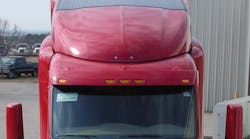Solar panels on tractors linked to driver attraction and retention
There are lots of factors to consider when trying to determine if solar panels are a good investment for your fleet. During our recent research for our Confidence on Solar Panels for Tractors we were unable to validate whether fleets that have installed solar panels are realizing savings. However, we discovered that a major motivator for fleets that choose solar has been “soft” benefits of driver satisfaction and retention, which should not be discounted given the current driver shortage.
But let’s start by looking at some potential financial savings.
The largest portion of financial savings from solar is related to increased battery life and potentially avoiding some emergency roadside calls for dead batteries. One key thing to consider includes the cost of battery replacements and the cost of emergency roadside assistance calls for dead batteries. If you are accounting for these as an expense, you might want to start tracking them so that you will have data when doing the financial calculations on solar for your fleet. You can estimate the number by looking at costs of batteries at a fleet level and analyzing a sample of breakdown instances to determine if they are battery-related.
Potential fuel savings associated with solar panels really revolve around two savings items associated with reduced idling resulting from the ability of an electric APU to run for an extended period of time and those associated with removing load from the alternator. A 300-watt tractor solar panel’s average output per day is worth approximately the energy stored in one Group 31 battery. Savings associated with removing load from the alternator during normal tractor-trailer operation, though not negligible, are generally very small. The average annual fuel savings from this factor based on a 300W panel would most likely be less than 0.1%.
Tractor trade cycle is another key factor in determining the return on investment of solar panels. Solar panel life is generally longer than the typical fleet trade cycle and it is unlikely that having the solar panel on the vehicle will increase residual value. In addition, the panels cannot easily be moved to a new tractor.
Estimating the savings due to “soft” benefits of driver satisfaction and retention is very difficult. If the tractors are equipped with electric APUs, being able to extend the time of operation without running them has more value to drivers than just the idle fuel savings. In addition, the cost of recruiting even one additional driver is likely to be significant to the fleet. Each fleet will have to ascertain if these are factors to incorporate in its individual analysis.
Once solar panels are installed, there are some things to be aware of. Look at the things that might need to be added to the PM program related to the panels.
- Are the panels working?
- Do they need to be cleaned periodically?
- Does the manufacturer specify a procedure or cleaning agent?
- Does battery PM program need to change (interval, changing one battery vs. entire set)?
There is no single answer to whether you should add solar panels to your specs, but a careful evaluation using the above factors should help make a decision that is right for your fleet’s needs.




